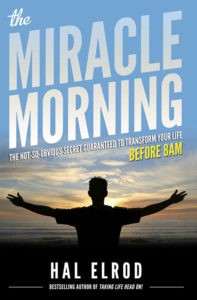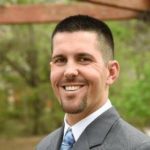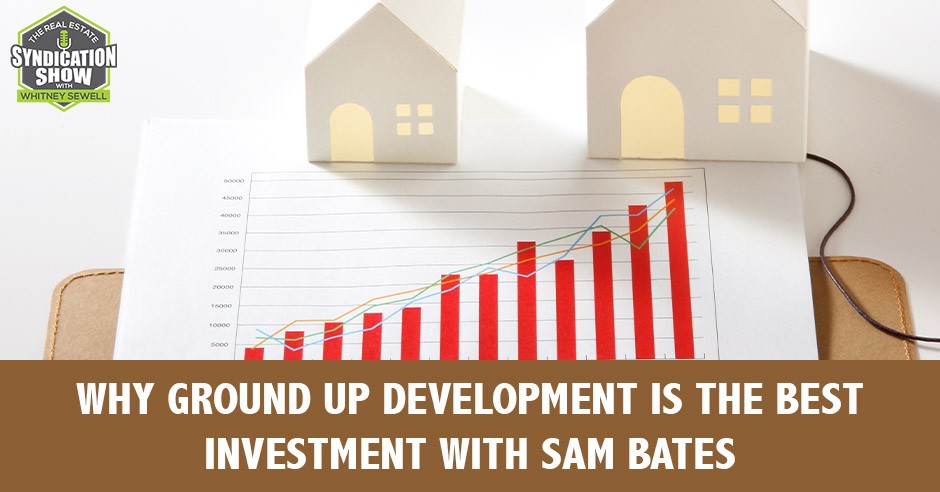Listen to the podcast here:
It is fortunate to be surrounded by business partners that have complementary skills to the ones you have. Host Whitney Sewell interviews Sam Bates, one of the partners in Trinity Capital Group who’s been directly involved in acquisitions development and asset management. Sam gives us a glimpse of how their partnership started looking into buying multifamily until they decided to do ground up development. As their company continues to grow and as they’re looking forward to providing investors a better experience, Sam emphasizes the value of doing value activities as opposed to administrative stuff that doesn’t add value to the company and creating a system of standard operating procedures in your real estate business.
Our Gracious Sponsor:
Are you wanting to learn how to gain financial freedom through having your own syndication business? Text LEARN to 474747 to begin to learn from one of the best in the industry, Vinney Chopra. Vinney came to the US with only $7 in his pocket, and now controls hundreds of millions of dollars of real estate he has acquired through multifamily syndication. He is now personally coaching others to do the same. Text LEARN to 474747 to begin your journey to starting your own syndication business! Vinneychopra.com
—
Watch the episode here:
Listen to the podcast here:
Why Ground Up Development is the Best Investment with Sam Bates
Real estate investor Sam Bates shares his experience with ground up development along with some key tips and strategies for new investors in the space.
On this episode, our guest is Sam Bates. Thanks for being on the show, Sam.
Thanks for having me, Whitney. I’m a huge fan of the show and I’m honored to be here.
I’m so honored. Sam is the Cofounder and Partner of Trinity Capital Group that is based in the Dallas Fort Worth area. In three years, Trinity has syndicated or joint ventured nine commercial real estate project set include apartment acquisitions development and an RV park. He has been directly involved in the acquisitions, development and rehabilitation, disposition and asset management of over $55 million in real estate since 2009. He has a Bachelor’s in Finance and a Master’s in Personal Financial Planning and an MBA. He is an avid reader, sports fan and Christian that strives to create value for his investors, tenants and the cities he conducts business in. Tell the audience a little more about who you are, what your focus is right now, what you’re involved with and we’ll dive in.
I have a background in finance and then I got an MBA. I initially got a consulting job after I graduated with my MBA in the stock market. I’ve planned on going and being a financial advisor and after the stock market crashed, I just couldn’t trust it. I started working at a consulting firm. I didn’t enjoy the job and I knew it wasn’t a long-term. I’ve always been interested in real estate. That initial interest has got me started to invest in 2009 or 2010 and it catapulted me into Trinity Capital. Right now we’re working on two developments. One is a 252-unit and others have 48-unit and we’re about to get another acquisition, which is 137 units under contract.
Tell me a little bit about your company because it’s as if you all are acquiring multifamily and you’re also developing. Is that ground up development?

Yes, this is ground up development. Me and one of my partners started looking to buy multifamily back in 2014 or 2015. We had worked together at the same consultant firms so we had the same values, morals, work ethic and we felt that it was a good partnership. We kept getting beat out or brokers were telling us we didn’t have any credibility because we hadn’t closed the deal. After we kept banging our head against the wall and it seemed that we were repeating the definition of insanity, Michael, who’s the second partner, he knows Daniel through his church. Daniel has been a home builder and developer for many years and we decided to do ground-up development. If we can buy acquisition, we would create one and it was a mixed-use development. Daniel already had the land that he was going to build a 10,000 square foot retail space for Keller Williams and gym as Anytime Fitness franchise and then he had a lot of land on the backside of it. He didn’t know exactly what he was going to do. We said we could structure the deal with the company to raise funds and that’s where it started.
Can we talk about that 252 units development deal? Where’s that at?
That’s in Weatherford, Texas, which is about twenty minutes West of Fort Worth.
Give us some details about that property. Maybe the top of the area or whatever else you can and we’ll go from there.
The area itself is a small community. It’s about 30,000 people and it’s in Parker County, which is the Horse Capital of the World. It’s on the edge of the cities and it has that country feel. We started doing some research, we’ve found land, and we’ve been through the development process before with a Kerrville Development and a couple of others. We have a third-party market study done to see if the demand is there. It came back and showed that there’s massive demand and we thought that there would be knowing the demographics of the area. It’s going to be a class A property and it’s going to have one, two and three bedrooms. There are not as many three bedrooms. There are more heavily one and two bedrooms to match tenant profile by the other complexes.
[bctt tweet=”Focus more on the value add activities instead of some administrative things that don’t add value to the company.” via=”no”]
It’s right around the high school and less than a mile from elementary and junior high. It’s in the perfect location right off the interstate. We went through the long process. We went almost down the route of HUD financing because there are so many benefits to get in a HUD loan. We were approved, but they gave us thirteen contingencies. After they gave us those contingencies, we felt that it’s better for us and for the investors to go down the traditional construction route. After we got that approved, now we’re going through the zoning and dealing with the city. As of now, we’re having our last zoning meeting so it should be approved and we get the permits and we can start breaking ground.
It’s a big decision it seems to me to say, “We’re going to go do some ground up development if I’m used to purchasing multifamily with some type of value add, Class B and C.” Tell us a little bit on that decision to say, “Maybe we don’t have much deal flow that’s worth looking at anyway and just multifamily. We’re going to go start our own development.” How did you make that decision and say, “We’re going to go do this and start developing as well?”
That’s where the company started as a development company. I wouldn’t have been able to do it on my own. Luckily, I’ve surrounded myself with a couple of partners that have expertise in areas I don’t or their skills are very complementary to mine. One of our partners has many years of development experience so we felt very comfortable moving in that route. We did a 60-unit development, we did over 48-unit development, and we’ve done a 200-acre lot development. Developments are very familiar with us. We like to go and be able to create value and create an opportunity for tenants, investors and even the city that might not be there. We’re fortunate because after our project was initially approved with the city, they put a moratorium on multifamily developments. We’ll be one of the last developments in that city for the foreseeable future so we should do very well.
Tell us some things about development that I wouldn’t even know to ask you. It’s not my space. Get us started. Is this something we want to pursue? Give us some reasons why we should and some of the due diligence that’s different than if you’re buying a class C property.
Some of the reasons why is taking an idea and if you have an idea or if you know per land is and seeing it from the starting point to the end, it can be very rewarding. I like to add value to all the people that we are associated with and our stakeholders, but it’s also beneficial. We’re able to develop class A properties for $80,000, $90,000, $100,000 depending on the land costs and are finished out. In DFW and a lot of areas throughout Texas and the nation, a lot of C class properties are at that or both. We feel that we’re getting a brand-new asset that will have minimal maintenance for ten to fifteen years compared to a C class property that you’re having to put a lot of cutbacks in on a continual basis or having older systems and older units. It’s not as energy efficient either as new developments.

There are lots of things to consider when developing. The biggest thing is time. Through the zoning process, every development we’ve done we’ve had lots of issues with zoning. If you’ve ever worked with the city government, you know that it takes a while to do a lot of things for the city. The timeline always is longer than what we expect. Another thing that’s happened in the past is trying to get easements to a different property and landowners. That can be stressful because they can either approve it or not approve it. If you can’t get water through their land, the developments run out of luck. If it’s out in the county, the city is a lot more controlled.
Tell us about how a deal like this would be structured. I assume it’s going to be very different than your normal multifamily class C purchase.
We structure it with a 60/40 split, and we don’t do a prep because you don’t see it receiving cashflow for possibly two years or even a little bit longer depending on how long the development takes. The lease stuff is usually six to twelve months depending on how big the development is so it’s harder to put a prep on it. We always invest a significant portion of the capital upfront and we feel that we’re taking on larger risks than a lot of investors that’s why the split is 60/40. Daniel, who’s one of my partners, has his own custom home business so he structures it where he gives us a fixed price for the contract and if he is over or under it, he benefits or has to give that cost. The investors are never in jeopardy of having to bring more money. It would always fall back on Daniel and his company. That might be a little bit different than how a lot of developers structure it, but we felt safe that way to pitch it to investors since we’ve started raising capital.
What’s the hold time on a development like this?
Since they are brand new, we want to have longer hold times. We project for eight to ten years. That’s going to change a lot with market dynamics and if we get an offer. We received an offer on the commercial development we did in month eight or nine that exceeded the returns that we projected into year five. We went through due diligence and held it for one year and one day, so we got the long-term capital gains and sold it. The investors were static. We returned a 41% IRR. It changes, but we’d like to hold long-term.
[bctt tweet=”Real estate is a very tough business. You have to have the internal fortitude to persevere.” via=”no”]
If you can return your fifth-year projections in less than a year, I can imagine you’re going to move on it. What type of buyer do you expect?
For this new project, we’re gearing it towards the institutional investors since it will be such a large development and it will be relatively new. It will still be A class. We think we can pull in somebody that’s looking for a good cashflow and not worrying too much about a lot of maintenance to operational issues. At this time in the market and how the market has been the last few years, there are a lot of mom and pops or smaller companies like ourselves that could easily take down 250-unit complex. The buyer we’re targeting could change over the years, but that’s who we’d like to target initially.
It’s not something that’s talked about very much about how the buyers are going to change as well or how they are changing. A lot of people are getting more sophisticated in building their businesses a lot stronger to be able to buy larger properties. Maybe a couple of people wouldn’t have been able to do that a few years ago. What’s the plan for your business going for more development or looking for more multifamily value add? What’s the plan?
We would like to start to gear more towards value add. It’s a quicker turnaround time. It’s a little bit safer. With that being said, the market is still hot. It’s harder to find value add deals. I underwrote 60 or 70 and we’ve only put LOIs on five and we’ve only had one LOI accepted. It’s very hard to scale when you’re going at that pace. We’re looking to do both, but if we had to focus, I would want to go to the value add.

How are you all looking for deals and how are you moving forward in that?
A lot of the deals from the land side, we have broker relations, realtor relationships and they’ve brought us the land. For the value add deals, I’m constantly talking to brokers, and we’re getting emails from operating memorandums and getting my footprint out to as many places as we can. We have properties in Texas and one in Mississippi. I’m looking all over the southeast for acquisitions and if they make sense and if they’re in the markets and neighborhoods that meet our criteria.
You’re talking to a broker and he says, “Sam, what’s your buying criteria?” What would he tell them?
Depending on the market, it might change. Typically, we’re looking anywhere from $10 million to $20 million assets that hopefully is 15% or under market rents where we can go in and renovate and take it up to market standard. Most of the assets right now had been renovated one or two cycles already so we’re looking at second and third generation renovations and that’s not appealing to us. We feel that we can add that much value. I try to get that out to the brokers where we want the deeper value adds, but it’s hard because markets that we’re looking in, they’ve been touched so many times.
What’s been the hardest part of the syndication business for you so far, Sam?
It’s been the deal flow. We’ve done nine projects, but most of the projects we’ve done had been projects we’ve created. Right now, it’s finding the right deals that work for us in the markets that we’re at. I’ve underwritten over 70 deals and only five made sense to us. People are buying them, but I don’t exactly understand their underwriting. I’d like to see their underwriting to see how they make the prices of thing.
Why not put out more LOIs, but offer what you think is a good price?
It’s a slippery slope when you’re talking to brokers and they tell you what the price is. You don’t want to come and undercut significantly, then you’re going to get the reputation of always undercutting and lowballing the deal. If you do that, brokers aren’t going to talk to you. In any deal I’ve underwrite, especially if I talked to the broker, I always give them feedback on what we think is great about the property, what we don’t like, what our price is for and where we’re coming in.
Let’s back up a little bit and tell me what are some of the biggest things that make these deals not work for you all?
That’s completely dependent on the market. In Texas, a lot of the counties have become very aggressive in property taxes. It seems like some of the buyers aren’t taking that into consideration. Other brokers on the offering memorandums usually aren’t taking in the new evaluations. That could change by $50,000, $100,000 to $200,000 and that’s a huge swing in value. There are some other things that will take account. I know the market and the rent rates had been going up significantly over the last few years, but I don’t know if I necessarily underwrite to what they’ve done in the last couple of years because you don’t expect that to continue. In all the data and information I read, everybody expects some type of correction this year or next year or possibly 2021, so I have to weigh that in the underwriting as well.
How do you weigh that in? Can you elaborate on that a little bit?
It’s taking a more conservative approach on rent growth. Some people will put 5% and 6% rent growth, which might happen, but it’s not realistic to be able to maintain throughout the whole period unless your whole period is very short. We’re trying to underwrite the income conservatively. We might not get a couple of deals in there, but it makes us sleep better at night when we do get a deal for our investors that we know their money is going to be a lot safer and what it might be if we had unrealistic expectations.
What’s a way that you all have improved your business that we can all apply to ours?
We start to submit ties in our business and writing SOPs, which are Standard Operating Procedures. In the last few years, we were running with our hair on fire. Honestly, I started doing business full-time last time. I was at an energy company before that so I was switching my time. Now, we’re trying to systematize and bring in employees and hopefully, build the focus on more of the value add activities instead of some of the administrative and things that don’t add value to the company.
Is spending time creating those have added value in the organization?
Yes and we’ve outsourced our bookkeeping already. The bookkeeper we have has done a phenomenal job. We haven’t brought in another employee, but in the next few months, we plan on bringing in an admin and possibly an underwriter asset manager to take some of that responsibility off me so I can go focus on deals or raising capital or things like that.
How did you all develop your standard operating procedures? Is that all from scratch or did you have some template? If I was to think about that and I already had a few partners, we’re doing a lot of deals and I was like, “We’re going to develop some standard operating procedures.” Coming up with that from scratch seems intimidating.
It might not have been the best way to handle it, but we did start from scratch. One of my partners is a CPA and I was in tax accounting for ten years, so we’ve written a lot of procedures for companies or clients. It made sense to take our knowledge that we had and write it out exactly how we wanted it and get detailed. The procedures can vary depending on underwriting their deal. There’s going to be variations depending on the deal but give guidelines for somebody who would understand. If they came in and looked up from scratch without any experience, they can get 70% to 80% of it underwritten where I could look at the remaining 20% to do some tweaks. With Daniel’s experience, he was the same way. It took a while to go through it, but we have them now where we think it’s a great set of guidelines that we could give an employee.
I can see the need and why those are valuable. Me, creating them from scratch, seems very daunting. Going forward, hiring somebody is going to make it much faster for them to come right in and get to work.
I’m big on reading. I’ve read The E-Myth several times and Traction and all those books that talk about processes and procedures that you have for a business to flourish.
Could you recommend any other books? You said Traction and The E-Myth which is very popular and highly recommended. Is there anything else?
Those are both good books. The one that impacted me the most was Miracle Morning. I read that several years ago and it changed my mindset. I was not a morning person. I honestly never read. Going through that and seeing the success he had, I completely changed my mindset, and now I’m up at 5:00 or 6:00 every morning. I do about an hour of reading, writing, affirmations, visualizations and it’s dramatically impacted me personally and professionally.
You all are dealing with investors and raising capital.
Yes, we are.
What’s the best way that you care for your investors and take care of them or maybe some way that you stand out above other operators?
That’s one thing we’re discussing is how to give the investor a better experience. It depends on the asset, but usually we’ll have yearly meetings and get all the investors together and give a presentation on how the property is performed. We also send out monthly emails every month. Once the property isn’t stabilized and we’re on the rehab process, depending on what’s going on, we might send out once a week or twice a month. It depends. Every investor is a little bit different. Sometimes I’ll talk with investors for 30 minutes a week or a month and some investors that give me the check and I don’t hear from them again. You have to know what they expect and go from there.
What’s the number one thing that’s contributed to your success, Sam?
It could be an avid reader or learner. Real estate is a very tough business, so you have to have the internal fortitude to persevere. When I got started out doing single-family stuff, there are issues that popped up all the time when I could easily quit. Why I didn’t is because it’s given me an opportunity to do some things I never would have dreamed of. It’s that desire to succeed and the drive in yourself to make you succeed.
I appreciate you saying that. It’s the internal fortitude and the drive. You’ve got to have it. You’re going to get kicked in the face numerous times, so you’ve got to be able to get back up and keep going. Sam, tell our audience how you’d like to give back.
I give back in a lot of different ways. I’m going on a mission trip to Uganda and it’s going to be sharing the gospel, but also micro-finance focused. We are helping people in Uganda create banks and savings institutions. They’re small communities because they don’t have that opportunity there. Also, give through the church that I go to and different organizations that are making an impact. That’s the main ways I give back. I’ll also help people if they have questions about real estate or if they’re just beginning. I’ll answer questions and hopefully get them on the right path.
Sam, thank you again for sharing about your team and what you all are up to from development to value add multifamily. Tell the audience how they can learn more about you and get in touch with you.
Thank you, Whitney, for having me. I can be reached on LinkedIn or Facebook. I don’t check social media that often, but I can also be reached at my email address at [email protected].
Sam, thank you so much. I appreciate the audience for being with us. I hope you all will go to Life Bridge Capital and connect with me and The Real Estate Syndication Show on Facebook. We will speak to each of you next time.
Important Links:
- Trinity Capital Group
- The E-Myth
- Traction
- Miracle Morning
- LinkedIn – Sam Bates
- Facebook – Sam Bates
- [email protected]
- The Real Estate Syndication Show– Facebook Page
About Sam Bates

Mr. Bates spent 10 years in Corporate America where he honed his business acumen and developed many characteristics that help him succeed in the real estate industry. Sam started at UBS Financial Services where he cultivated his knowledge about the financial markets. He directly worked with advisors that had over $3 Billion in assets under management. One of his proudest accomplishments at UBS was helping an advisor grow his total assets under management from $500 million to $850 million through multiple marketing campaigns. After graduate school, Mr. Bates transitioned his career to state and local taxes. During his tax career, he helped companies save more than $45MM in transaction tax overpayments to local and state jurisdictions.
Mr. Bates started his real estate career as a limited partner in a 208-unit value-add apartment syndication in Dallas. The syndication didn’t perform as well as planned and Sam knows he needed to take his financial future in his own hands and not rely on other people. During the syndication investment, he started investing in single-family homes. From 2010 to 2013, Mr. Bates purchase 17 single family homes. He used multiple strategies to acquire these homes and he still has 8 in his rental portfolio.
In 2016, Sam started Trinity Capital Group with two other gentlemen. Trinity Capital
is committed to developing lasting relationships with our investors by providing them with exceptional customer service and wealth building opportunities through quality real estate investments. Trinity generates value creation through development or value-add opportunities we see in the market.
Over the last three years, Trinity Capital has been involved with 9 projects to create value for their investors. The projects cover the gamut of commercial real estate.
- Apartment acquisition – 2
- Apartment development – 4
- Retail development – 1
- RV Park acquisition – 1
- Subdivision development – 1
Sam plays a vital role in many aspects of these transactions. His responsibilities include sourcing and underwriting all acquisitions and dispositions, is the liaison with attorneys, Trinity Capital, sellers and their brokers, capital raiser for each project, investor relations, and asset management.
Sam graduated from Texas A&M University with a BBA in Finance, an MS in Personal Financial Planning, and an MBA from Texas Tech University. Sam is an avid reader, sports fan, and loves the outdoors. He attends Munger Place Church in Dallas.
Love the show? Subscribe, rate, review, and share!
Join the Real Estate Syndication Show Community:




